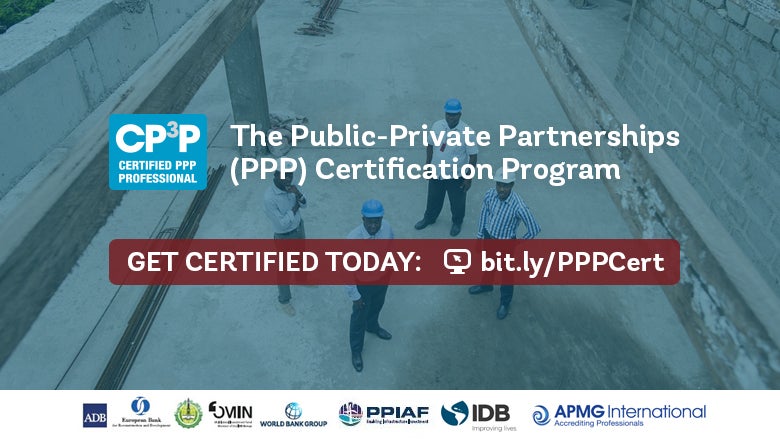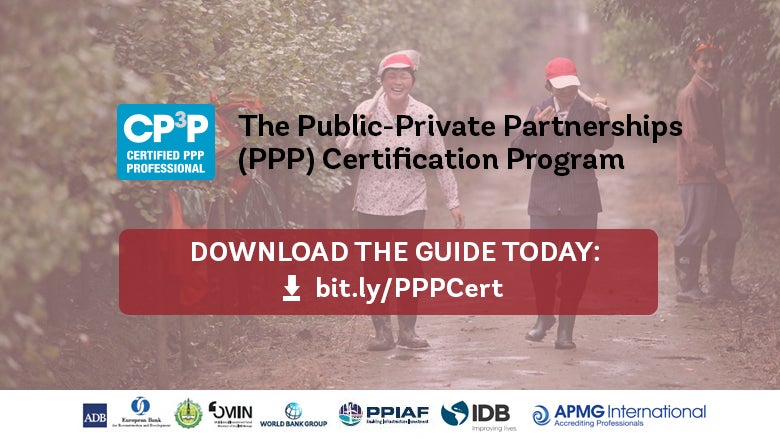
Although institutions and the private sector have devoted both money and time to capacity building in public-private partnerships (PPPs) for infrastructure, results have been mixed. A misalignment of expectations remains – and this manifests itself in too few deals reaching the market and the wrong projects being proposed as PPPs. But a group of multilateral development banks (MDBs) is committed to solving this problem with the new APMG PPP Certification Program. This innovative, collaborative approach to setting standards for PPP professionals will ultimately result in PPP projects that are appropriate solutions tailored to the needs of the people they serve. This is the first time the MDBs have come together to support a global curriculum on PPPs , which is accessible to anyone with an internet connection – and part of it is offered at no cost.
As a longtime PPP professional and the project team leader behind the World Bank Group’s contribution to the APMG PPP Certification Program, I’ve had the opportunity to learn a great deal about PPPs during the process of creating the program, and I’m looking forward to enrolling. The course allows those of us who do the deals to institutionalize our experience via a uniform set of standards and a widely recognized credential. This benefits governments, the private sector, and citizens across emerging markets and developing economies as well as each individual PPP practitioner.
The APMG PPP Certification Program is an innovation of the Asian Development Bank (ADB), the European Bank for Reconstruction and Development (EBRD), the Inter-American Development Bank (IDB), the Islamic Development Bank (IsDB), the Multilateral Investment Fund (MIF), and the World Bank Group (WBG). The program is funded in part by the Public-Private Infrastructure Advisory Facility (PPIAF). It is produced and administered by APMG-International, a global examination institute. All of these groups share a vision of enhancing PPP performance globally by making sure that the right projects are selected as PPPs and managed effectively.
PPP Certification Guide and professional recognition
The foundation for the program is the PPP Certification Guide, the definitive body of knowledge on PPPs, which compiles a range of quality materials on good practices for PPPs. It can be used to support study for the APMG PPP Certification Program or as a stand-alone downloadable publication on PPPs. It was produced by a group of PPP practitioners with extensive sectoral knowledge and broad regional experience and reviewed by over 80 PPP experts from the public and private sector. It is published online and available for free on the website.
What makes this program especially unique is that PPP professionals can take exams to earn the new CP3P credential. The Foundation level exams are now available for self-study and work is underway to develop the Preparation and Execution level exams. The Foundation exam is aimed to test that candidates have sufficient understanding of the first chapter of the PPP Guide, ensuring they will be able to act as an informed member of a PPP finance project.
Once all three of the APMG PPP Certification Program levels are available, candidates will have the opportunity to gain the Certified Public-Private Partnerships Professional (CP3P) credential – providing them with global recognition of PPP proficiency.
A worldwide effort to improve PPP practice
The uniform set of PPP qualifications that the APMG PPP Certification Program offers, alongside the MDB-endorsed professional credential, will be useful to governments, which can enroll their staff to increase capacity in-country and be better prepared to either lead or oversee PPP projects. The program also benefits PPP professionals, who can use their real-world experience to advance more quickly in the curriculum to receive the certification and designation that reflects their hard-earned acumen, for the first time receiving professional recognition for their experience.
As PPPs mature, it’s time for those of us who do the deals to recognize that institutionalizing our experience via a uniform set of standards and a widely recognized credential will help guarantee that the right projects become PPPs, and that these PPPs are led by people whose training and experience is recognized by institutions across the globe. For further information, to download the PPP Guide by chapter, or to begin studying for your Foundation exam, please visit: https://www.ppp-certification.com/.


Join the Conversation